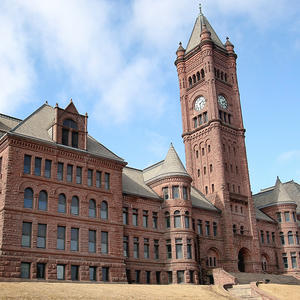The district joined three other Twin Cities-area districts in being added to an amended civil complaint filed in State District Court in Ramsey County. The lawsuit challenges the constitutionality of certain state teachers’ laws that plaintiffs say protect ineffective teachers and perpetuate achievement gaps.
Four parents are listed as plaintiffs, including Duluth’s Bonnie Dominguez, who claims in the lawsuit that her 13-year-old daughter “lost significant ground” while enrolled at Myers-Wilkins Elementary School.
The school districts — including St. Paul, Anoka-Hennepin and West St. Paul-Mendota Heights-Eagan — were added as defendants alongside the state of Minnesota, Gov. Mark Dayton and the Minnesota Department of Education.
“The lawsuit itself is directed at Minnesota state laws, and the authorities that are ultimately responsible for enforcing the law — the state of Minnesota and Department of Education,” said Jesse Stewart, an attorney with the New Orleans-based Fishman Haygood law firm representing the plaintiffs. “However, the actual hiring and firing decisions as to teachers are made by local school districts. We felt the local school districts deserved the opportunity to have their voices heard as well.”
The Duluth school district and Annie Harala, Duluth School Board president, demurred when asked to comment on the district’s addition to the lawsuit.
“The district received notification of amendments to the suit,” said district spokeswoman Katie Kaufman. “It will be reviewed by legal counsel.”
Kaufman referred the News Tribune to the Minnesota Attorney General’s Office, which did not respond in time for this story.
Harala said a member of the school board was served with the lawsuit, satisfying the legal requirement for alerting the board as a whole.
“It’s still so early on in this process,” Harala said. “There are processes in place when the district is involved in a lawsuit and we make it a rule to follow those.”
The News Tribune first reported on the lawsuit in April, when the Duluth school district was cited as an example repeatedly throughout the court filing, but not yet listed as a defendant.
Each of four plaintiffs in the lawsuit are parents with children who attend schools in the districts that now find themselves as defendants. The suit is called Forslund vs. Minnesota for the name of the lead plaintiff, Tiffini Forslund of Minneapolis.
But the application of state law, says the plaintiffs’ attorney, isn’t restricted to the districts named in the lawsuit.
“We make very extensive allegations that this is a problem that occurs statewide,” Stewart said.
The lawsuit is being supported by the national education reform group Partnership for Educational Justice and the Minnesota chapter of Students for Education Reform.
The lawsuit is challenging the constitutionality of Minnesota laws related to teacher tenure, dismissal and school districts’ use of seniority when making staffing decisions. It seeks to have the laws ruled unconstitutional, claiming they deprive students of “their fundamental right to a uniform and thorough education,” said the lawsuit.
Similar lawsuits also have been filed in New York and California; last month a state appeals court judge in California overturned a lower-court ruling in that lawsuit that had ended tenure and other job protections for public school teachers in the state. At the time, the plaintiffs said they planned to appeal.
Lawsuit claims
In the Minnesota case, another development this week saw civil rights attorney Nekima Levy-Pounds join the case as co-counsel, representing the four plaintiff parents. Levy-Pounds is the president of the Minneapolis chapter of the NAACP and a law professor at the University of St. Thomas.
“I am fighting on behalf of these four families, and all Minnesota families, because our public schools are not providing equal opportunities for educational success,” she said in a news release.
The lawsuit claims that the state’s teacher tenure law requires administrators to determine permanent employment for teachers after only three years, which it says isn’t enough time to gauge performance; that dismissal policies in Minnesota school districts make it “nearly impossible” to efficiently remove an ineffective teacher from the classroom; and that the “last-in, first-out” policies force administrators to lay off teachers based on seniority rather than quality and effectiveness.
As a result, the lawsuit claims, the state’s problem with poor graduation rates and academic performance among low-income and minority students continues. Minnesota has one of the country’s worst achievement gaps between poor and minority students and white students. In recent years, lawmakers have agreed to policy changes and hundreds of millions of dollars in new spending to try to close those gaps.
As one example, the lawsuit points to test scores of students at Myers-Wilkins, a school with a nearly 80 percent low-income population, and compares them to those of Congdon Park Elementary, with a roughly 20 percent low-income population. Congdon Park has a largely white population, while Myers-Wilkins’ enrollment of minority students is just over half.
State standardized test scores at Myers-Wilkins show just over half of its students are proficient in reading and math, while at Congdon Park more than 80 percent of students are proficient in each.
Nearly 70 percent of teachers at Myers-Wilkins have been on staff for more than 10 years and have a master’s degree. At Congdon, 95 percent have been on staff for more than 10 years, with 91 percent holding a master’s degree.
The lawsuit raises concerns about teachers at Myers-Wilkins having less experience and the school not seeing test scores on par with Congdon Park.
“Despite being less-qualified and unable to match district averages on student assessments, teachers at Myers-Wilkins have, on average, taught for three years or more and are therefore protected from dismissal by the tenure and dismissal provisions,” the lawsuit says.
The lawsuit also asserts that students at Myers-Wilkins “are more likely to lose their teachers, possibly their best” (with 11 percent working less than three years) than Congdon Park students if layoffs occur, because of the “last in, first out” policies.
The lawsuit alleges that the same general pattern plays out across Duluth schools.
Duluth Federation of Teachers president Bernie Burnham told the News Tribune when the initial lawsuit was filed last month that the union has worked hard to build a teacher evaluation plan that ensures teachers get needed feedback.
“Teacher tenure does not protect bad teachers; it ensures good teachers have the ability to use their teacher voice to advocate for students, their families and education as a whole,” she said.
Duluth school district superintendent Bill Gronseth told the News Tribune last month that processes are in place for supporting and training teachers “who might need some help with their performance.”
New teacher evaluation laws have increased accountability in Minnesota, he said. He noted that the majority of Duluth’s teachers have more than 15 years of experience or an advanced degree, including at Myers-Wilkins.
“I think the teachers at Myers-Wilkins are really dedicated,” Gronseth said last month. “Parents I talk with and staff I talk with love their school and feel their teachers are very highly qualified and supportive of their students.”
The school has never been designated as low-performing under state accountability measures enacted in 2012.
The next step in the lawsuit will be for the defendants to file a response.
Please visit the source link below to read the entire article.
Source: www.duluthnewstribune.com



